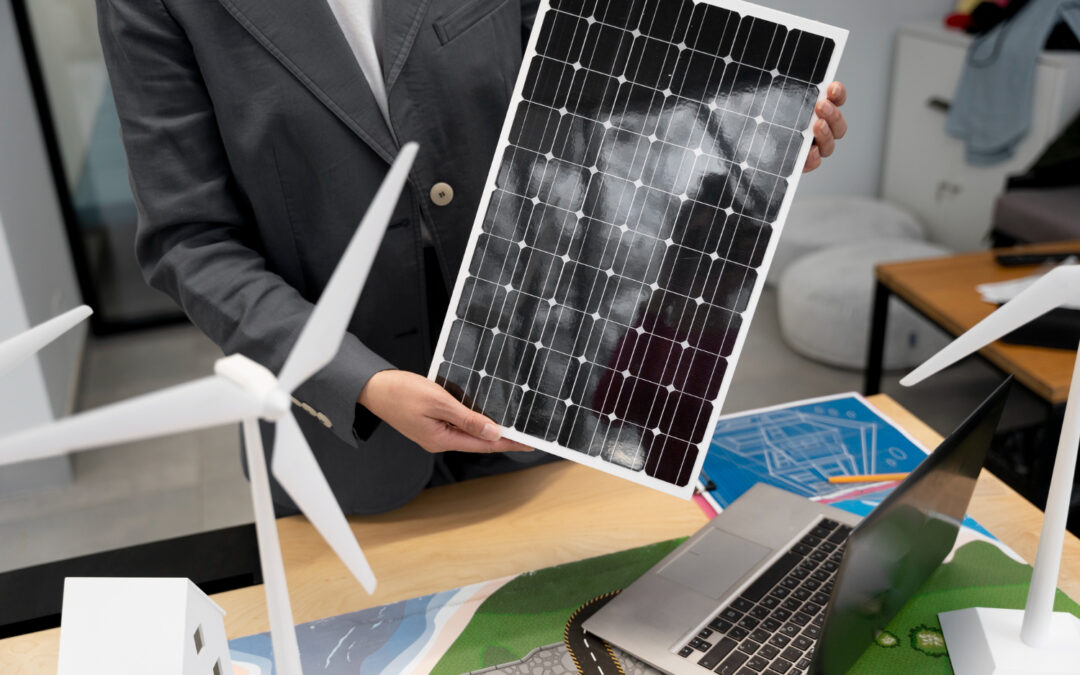In recent decades, industries worldwide have faced a critical challenge: maintaining productivity without compromising environmental sustainability. Amid the global climate crisis, air pollution, and resource overexploitation, the shift toward green energy and sustainable industrial practices has become urgent.
Green energy, sourced from renewable and environmentally friendly resources such as solar, wind, and biomass, is increasingly seen as a cornerstone of green industry transformation. This approach not only helps mitigate environmental harm but also drives innovation, competitiveness, and compliance with global decarbonization targets.
For Indonesia, a rapidly developing economy with a growing industrial sector, the transition presents both a challenge and a major opportunity. The government has introduced regulations and incentives to accelerate adoption of renewable energy (Energi Baru dan Terbarukan – EBT) within industry.
Understanding the Concept of Green Industry
A green industry refers to industrial operations that prioritize efficiency and sustainable resource use throughout the production cycle — from raw materials to energy and waste management. Its objectives extend beyond reducing emissions and waste:
- Driving low-carbon technology innovation
- Promoting renewable energy adoption
- Safeguarding environmental functions
- Delivering social and economic benefits to surrounding communities
The Ministry of Industry encourages businesses to adopt green industry standards as part of its commitment to global decarbonization efforts. It is in line with Indonesia’s Enhanced Nationally Determined Contribution (ENDC), submitted in 2022, which raised the country’s emission reduction targets to 32% unconditionally and 43% with international assistance.
Key Approaches to Green Industry Transformation
Industrial players can implement green practices through three main strategies:
- Sustainable Raw Materials
- Use renewable materials
- Reduce water and energy consumption
- Ensure human and environmental safety
- Energy and Technology Efficiency
- Adopt low-carbon technologies
- Utilize renewable energy sources (solar, wind, biomass)
- Implement energy conservation programs
- Waste Management
- Apply clean production methods
- Recycle materials
- Improve raw material efficiency to minimize waste
Practical examples include:
- Palm oil and cement industries using production waste as alternative fuel
- Textile factories in West Java adopting water recycling and energy-saving technologies
- Food and beverage plants generating biogas from organic waste
- Industrial estates installing rooftop solar panels to cut operational costs and carbon emissions
Strategic Benefits of Using Green Energy in Industry
Transitioning to renewable energy is not just about environmental responsibility; it is also a smart business strategy. Key benefits include:
- Operational Cost Savings
According to the Ministry of Industry, green energy adoption in manufacturing saved Rp 3.2 trillion in 2022. Efficient energy use, waste management, and conservation systems reduce electricity, water, and raw material costs.
- Emissions Reduction and Environmental Impact
Renewable energy sources emit significantly less carbon than fossil fuels, helping mitigate climate change and reducing reliance on polluting energy.
- Enhanced Reputation and Competitiveness
Companies adopting Environmental, Social, and Governance (ESG) principles gain stronger consumer trust and attract investors seeking long-term sustainability. Responsible branding strengthens customer loyalty and access to international capital and partnerships.
- Licensing Ease and Incentives
Businesses embracing renewable energy may benefit from tax breaks, duty exemptions, and simplified licensing. These align with Indonesia’s energy mix target of 23% renewables by 2025.
Indonesia’s Legal Framework on Green Industry and Renewable Energy
Industrial Law Obligations
Under Article 80 of Law No. 3/2014 on Industry (UU Perindustrian), compliance with green industry standards is mandatory. These standards include:
- Efficient resource use
- Emission reduction
- Waste management
- Adoption of eco-friendly technology
Non-compliance may result in administrative sanctions, including:
- Written warnings
- Fines
- Temporary suspension
- Revocation of industrial licenses
Renewable Energy Incentives
Presidential Regulation No. 112/2022 (Perpres 112/2022) provides fiscal and non-fiscal incentives to accelerate renewable energy development for electricity supply, such as:
- Tax incentives (income tax facilities, tax allowance, tax holiday)
- Import duty exemptions for renewable-energy equipment
- Land and property tax relief
- Geothermal development support
- State-backed financing and guarantees
Industries investing in renewable energy can access green financing, carbon credits, and international partnerships, creating opportunities for innovation and long-term profitability.
Industri yang berpartisipasi dalam pengembangan ini dapat memperoleh insentif berupa tax allowance (pengurangan pajak penghasilan hingga 30% dari nilai investasi), tax holiday (pembebasan pajak hingga 20 tahun), serta pembebasan bea masuk untuk impor mesin dan peralatan produksi berbasis EBT.
Also read: Indonesia’s Shift to Renewable Energy in Transportation: EV Policies, Challenges & Future Outlook
Green Energy as a Legal Obligation and Business Advantage
For Indonesian industries, adopting renewable energy and green industry practices is no longer optional, it is both a legal requirement and a strategic advantage. Compliance ensures avoidance of sanctions, while businesses also gain cost efficiency, improved ESG reputation, and access to government incentives.
Ultimately, green energy adoption strengthens industrial resilience, enhances competitiveness in global markets, and contributes to Indonesia’s broader climate commitments.***
Also read: The Opportunities Behind Indonesia’s New Energy Regulations
Regulations:
- Undang-Undang Nomor 3 Tahun 2014 tentang Perindustrian (“UU Perindustrian”).
- Peraturan Presiden Nomor 112 Tahun 2022 tentang Percepatan Pengembangan Energi Terbarukan (“Perpres 112/2022”).
References:
- Kemenperin: AIGIS 2025 Wujud Kolaborasi Menuju Transformasi Industri Hijau. Kementerian Perindustrian Republik Indonesia. (Diakses pada 20 Agustus 2025 pukul 10.08 WIB).
- Pengertian Industri Hijau: Penerapan, Konsep, dan Contohnya. Tirto.id. (Diakses pada 20 Agustus 2025 pukul 10.16 WIB).
- Terapkan Industri Hijau, Sektor Manufaktur Hemat Energi Hingga Rp3,2 Triliun. Kementerian Perindustrian Republik Indonesia. (Diakses pada 20 Agustus 2025 pukul 10.26 WIB).
- Penerapan ESG Pengaruhi Daya Tarik Investasi Global di Industri Tambang. Investor.id. (Diakses pada 20 Agustus 2025 pukul 10.42 WIB).
